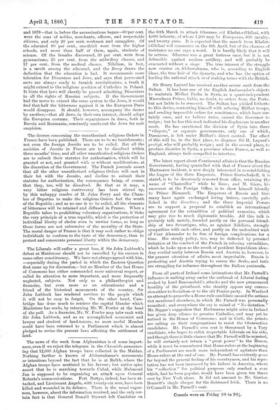The news of the week from Afghanistan is of some
import- ance, even if we reject the telegram in the Chronicle announce- ing that 12,000 Afghan troops have collected in the Maidan. Nothing further is known of Abdurrahman's movements -or intentions beyond the fact that he is at Balkh, where the Afghan troops have mutinied in his favour ; but native spies assert that he is marching towards Cabal, while Mahmoud Jan is supposed to be organising an attack upon General Roberts's communications. Fort Battye, indeed, has been at- tacked, and Lieutenant Angelo, with twenty-six men, have been killed and wounded in its defence. There is the usual vague- ness, however, about the information received, and the only cer- tain fact is that General Donald Stewart left Candahar on
the 30th March to attack Ghuznee, aid Khelat-i-Ghilzai, with 4,000 infantry, of whom 1,200 may be Europeans, 800 cavalry, and twenty guns. It is expected that the march from Khelat- i-Ghilzai will commence on the 8th April, but of the chances of resistance no one says a word. It is hardly likely that it will be serious. Ghuznee was a great fortress once, but it is not defensible against modern artillery, and will probably be evacuated without a siege. The true interest of the struggle now centres on Abdurrahman, who is, according to English ideas, the true heir of the dynasty, and who has the option of leading the national attack or of making terms with the British.
Sir Henry Layard has received another severe snub from the Sultan. It has been one of the English Ambassador's objects to maintain Midhat Pasha in Syria, as a quasi-independent Mussulman Prince, liable, no doubt, to orders from the Porte, but not liable to be removed. The Sultan has yielded hitherto to this device, contenting himself with refusing Midliat troops, and sending impossible orders for remittances, which have cer- tainly once, and we believe twice, caused the Governor to resign ; but he has this week indicated his displeasure in another mode. He has sanctioned the division of Syria into three " vilayets," or separate governments, only one of which, Damascus, is left under Midhat's direct control. The effect of this will be, in the first place, to disgrace Sir H. Layard's protege, who will probably resign ; and in the second place, to produce disorder in Syria, a province where France, as well as England, always feels compelled to interfere.


































 Previous page
Previous page